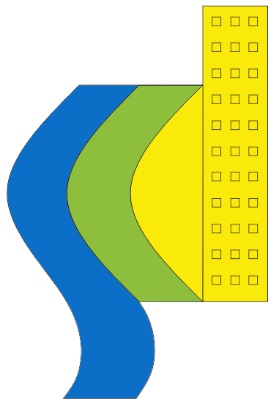What is a Smart City ?
EU definition (2014) of
smart city is 'A smart city is a city seeking to address public issues via ICT based
solutions on the basis of a municipality based multi-stakeholder partnerships'.
A Smart City is a well
performing city built on the ‘smart’ combination of endowments and activities of
self-decisive, independent and aware citizens.” (Rudolf Giffinger,
2007)
Why We Need Smart Cities?
Globally, more people
live in urban areas than in rural areas, with 54 per cent of the world’s population
residing in urban areas in 2014. In 1950, 30 per cent of the world’s population
was urban, and by 2050, 66 per cent of the world’s population is projected to be
urban. (United Nations, 2014)
Urban expansion in India
will happen at a speed quite unlike anything the country or the world has seen before.
It took nearly 40 years (from 1971 to 2008) for India’s urban population to rise
by nearly 230 million; it will take only half that time to add the next 250 million.
This expansion will affect almost every state. (McKinsey Global Institute, 2010)
The extraordinary level
of urbanization and consequent growth in size and numbers of cities in India present
both challenges and opportunities. The phenomenal growth in urban population challenges
traditional approaches to city management. To address challenges of Urbanization
and Urban Growth, Government of India has initiated Smart City program. This initiatives
is directed at how the respective cities can transform themselves in different policy
areas such as the use of alternative or renewable energy, use and management of
natural resources, waste reduction and management, carbon emission, green areas,
to desired sustainable socio-economic outcomes.
In a smart city, economic
development and activity is sustainable and rationally incremental by virtue of
being based on success-oriented market drivers such as supply and demand. They benefit
everybody, including citizens, businesses, the government and the environment.
With increasing urbanisation
and the load on rural land, the government has now realised the need for cities
that can cope with the challenges of urban living and also be magnets for investment.
The Prime Minister has a vision of developing ‘one hundred Smart
Cities’, as satellite towns of larger cities and by modernising the existing mid
- sized cities.”
The cities with ongoing or proposed smart cities include Kochi in Kerala, Ahmedabad
in Gujarat, Aurangabad in Maharashtra, Manesar in Delhi
NCR, Khushkera in Rajasthan, Krishnapatnam
in Andhra Pradesh, Ponneri in Tamil Nadu and
Tumkur in Karnataka.
The concept of smart cities
originated at the time when the entire world was facing one of the worst economic
crises. In 2008, IBM began work on a 'smarter cities' concept as part of its Smarter
Planet initiative. By the beginning of 2009, the concept had captivated the imagination
of various nations across the globe.
Countries like South Korea,
UAE and China began to invest heavily into their research and formation. Today,
a number of excellent precedents exist that India can emulate, such as those in
Vienna, Aarhus, Amsterdam, Cairo, Lyon, Málaga, Malta,
the Songdo International Business District near Seoul,
Verona etc.


